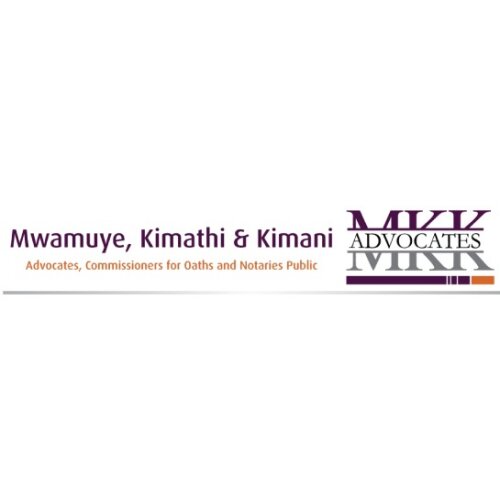Best Oil, Gas & Energy Lawyers in Kisumu
Share your needs with us, get contacted by law firms.
Free. Takes 2 min.
List of the best lawyers in Kisumu, Kenya
About Oil, Gas & Energy Law in Kisumu, Kenya
Kisumu, as part of Kenya, is governed by the national Kenyan laws regarding oil, gas, and renewable energy. Despite much of Kenya's oil resources being concentrated in the northern region, projects closer to Kisumu, such as the development of geothermal energy near Lake Naivasha, are also important parts of the national energy sector. Energy law in this context involves regulations related to extraction, production, distribution, and usage. It intersects with environmental, business, and land laws, making it a complex and multifaceted area of practice.
Why You May Need a Lawyer
Legal advice is beneficial in several common situations in the field of oil, gas, and energy. This ranges from navigating compliance with environmental protection provisions while developing energy projects, securing contractual rights on land slated for development or extraction, arguing cases of alleged harm from operations, or ensuring adherence to business and tax regulations in the energy sector. An experienced lawyer can guide these processes to their most successful conclusion.
Local Laws Overview
The key legal instrument for oil and gas resources in Kenya is the Petroleum (Exploration and Production) Act. This dictates the roles of various government entities, requirements for operating licenses, revenue management, and community engagement. The Energy Act of Kenya, another indispensable law resource, oversees the renewable energy sector. It addresses subjects like electricity generation, energy regulations, and distribution. Additionally, the Environmental Management and Coordination Act ensures that all energy projects meet environmental standards.
Frequently Asked Questions
What is the role of the Energy and Petroleum Regulatory Authority?
The Energy and Petroleum Regulatory Authority oversees the economic and technical regulation of electricity, renewable energy, upstream petroleum, and mid and downstream petroleum sectors in Kenya. They are responsible for tariffs and rates, safety measures, competition, and the general good conduct of licensees.
Can foreign companies explore for oil and gas in Kenya?
Yes, foreign companies can explore for oil and gas in Kenya, provided they have the right licenses from the Kenyan authorities. These companies also need to meet other business operations criteria set by the Kenyan government and the Energy and Petroleum Regulatory Authority.
What are the forecasts for geothermal energy development in Kenya?
Kenya is a world leader in geothermal energy production and it plays a significant role in the country's energy balance. The trend is expected to continue due to the country's vast untapped geothermal potential, estimated to be 10 GW.
Are there any local content requirements in the energy sector in Kenya?
Yes, Kenya has introduced local content requirements aimed at promoting local participation in the oil, gas, and mining sectors. These include procurement of local goods and services, employment and training of local staff, and technology transfer.
What environmental regulations apply to energy projects in Kenya?
All energy projects, including oil, gas, and renewable energy, are subject to environmental regulations enforced by the National Environment Management Authority. These regulations are stipulated in the Environmental Management and Coordination Act.
Additional Resources
For those seeking additional information, the Energy and Petroleum Regulatory Authority, the Ministry of Energy, and the National Environmental Management Authority are useful points of reference. The Energy Act and the Petroleum (Exploration and Production) Act are valuable legal documents to understand the broader law context. Moreover, international firms like Norton Rose Fulbright and Baker McKenzie often provide guides and overviews of Kenyan energy law.
Next Steps
If you find yourself in need of legal assistance in the field of oil, gas, and energy in Kisumu, Kenya, your first step should be to contact a reputable law firm that specialises in this area. They can provide a more specific and personalised advice tailored to your situation. Additionally, keeping yourself informed on the existing regulations can also be beneficial to communicate effectively with your legal counsel.
Lawzana helps you find the best lawyers and law firms in Kisumu through a curated and pre-screened list of qualified legal professionals. Our platform offers rankings and detailed profiles of attorneys and law firms, allowing you to compare based on practice areas, including Oil, Gas & Energy, experience, and client feedback.
Each profile includes a description of the firm's areas of practice, client reviews, team members and partners, year of establishment, spoken languages, office locations, contact information, social media presence, and any published articles or resources. Most firms on our platform speak English and are experienced in both local and international legal matters.
Get a quote from top-rated law firms in Kisumu, Kenya — quickly, securely, and without unnecessary hassle.
Disclaimer:
The information provided on this page is for general informational purposes only and does not constitute legal advice. While we strive to ensure the accuracy and relevance of the content, legal information may change over time, and interpretations of the law can vary. You should always consult with a qualified legal professional for advice specific to your situation.
We disclaim all liability for actions taken or not taken based on the content of this page. If you believe any information is incorrect or outdated, please contact us, and we will review and update it where appropriate.









